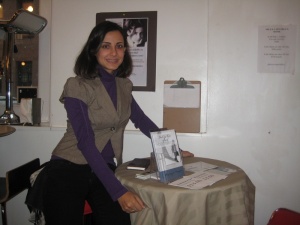How a New York City Girl Came to Love High School in Iran
Iran is a beautiful country with one of the world’s richest heritages, but for an American teenager raised in New York City, moving there can be a potentially painful culture shock.
When Shaghayegh “Sharon” Farsijani’s father took her to Iran to experience the traditions of his birthplace, she found beauty in unexpected ways.
“Imagine this: you’re a Brooklyn girl and, just as you’re entering into the most transformative period of your life – the teenage years – you move to a very religiously observant country, where liberties American girls take for granted can get you into lots of trouble,” says Shaghayegh “Sharon” Farsijani, author of the new book, “Lacking Lips of Time.”
Like the other girls at her school, Farsijani wore a burqa, although hers was not the head-to-toe robe common in Arab countries.
“My burqa covered my head and down to the hip, and under it I wore a ‘manto,’ which is similar to a raincoat to cover the rest of my body,” she says.
But while the modest garments required for women hid much from the eyes, Farsijani discovered they could still see into each other’s hearts. They shared many of the same feelings — likes and dislikes curiosity and yearnings, joy in all of the sensations of light, sound, smell, taste and touch.
“We were different but we were very much alike,” she says.

Muslim women wearing burqas – Photo credit: National Secular Society, http://www.secularism.org.uk/blog/2012/08/women-can-choose-to-wear-the-burka–but-can-they-choose-not-to
As she tried to adjust to the more restrictive Muslim rules governing women in Iran, Farsijani discovered a powerful source of freedom. Not only did writing poetry allow her to explore and express her own feelings, it helped her understand and appreciate the beauty in the new world around her.
“Whether or not you ever share your poetry, it can be the catalyst for turning a difficult experience into a time of growth and appreciation,” she says.
She offers four reasons why:
• Poetry is one of the freest forms of written art: Poetry is nearly as diverse as the many cultures of the world. There are limericks, haikus and sonnets among structured forms, but there are many free-verse styles that have changed the world, including rap. Poetry is one of the least encumbered forms of written and spoken expression; it is by its very nature liberating.
• It provides a safe place to express what is publicly taboo or prohibited: The very conservative values of today’s Iran means it’s often not socially acceptable for teenage girls to express themselves in terms of personal fashion choices or in behaviors such as dating boys. It was the intuitive nature of poetry that helped Farsijani open the door to the deep inner sensuality of her being.
• It can express a great deal in comparatively few words: Poetry written in English, for example, can seem like a foreign language to many English speakers who do not know how to feel the written and spoken word. While those who’ve never experienced poetry in its fullness may not understand it, poets and poetry lovers appreciate its ability to express the ineffable.
• Easily memorized, it’s also easily recalled when needed: Before the printed word became accessible to the average person with the Gutenberg press, poetry’s rhythm and rhyme verse schemes were used to memorize vast quantities of information. Similarly, a line written and remembered by a young girl enduring social pressure can serve as a mantra — a life raft for sanity and personal integrity.
“It wasn’t easy, but with the help of poetry, I was able to endure challenging teenage years in Iran, which I was finally able to see as beautiful,” Farsijani says.
About Shaghayegh “Sharon” Farsijani
Shaghayegh “Sharon” Farsijani has a cultural background that is as diverse as her poetry is sensual. Born in New York City, she moved to Tehran with her father, a native Iranian who wanted her to experience the culture of her ancestors. She eventually made her way to California, then to Paris and finally New York City again. After working as a reporter, graduating with her MBA and traveling extensively, she embarked on a journey to write with a deeper focus, culminating in her first book of poetry.
The foregoing article was provided by the PR firm News and Experts, a division of EMS Incorporated, and used with permission.
Lacking Lips of Time
Shaghayegh Farsijani’s first published poetry collection, Lacking Lips of Time, is an intrinsic look into deep experiences and feelings many of us have left orphaned, dusted, and alone. She gives natural life to anything with the power of sensuality at its peak like an artist splashing colors to everyday nouns and verbs. She will reach out and give life to suppressed and sleeping emotions deep within your soul. Her work is like timeless fractals of the human condition dancing on fearless poppies. (Taken from descriptions at Sharon Farsijani’s website home page.)





Thank you for sharing this amazing young woman. Her story give hope the words is alive and well everywhere.
LikeLike
John, you are so welcome. I felt much the same way as you when I read about her.
LikeLike
Young woman like her show us what we can do if we try.
LikeLike
Absolutely. Next time I think I’m living with a “bad” situation, I think I might try harder to find the beauty in it.
LikeLike